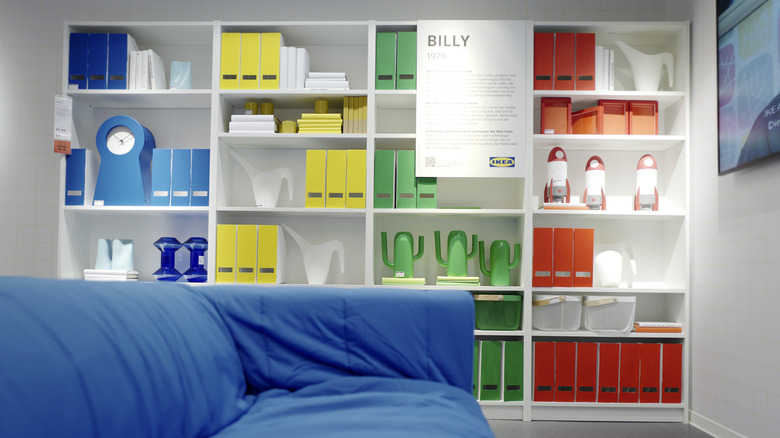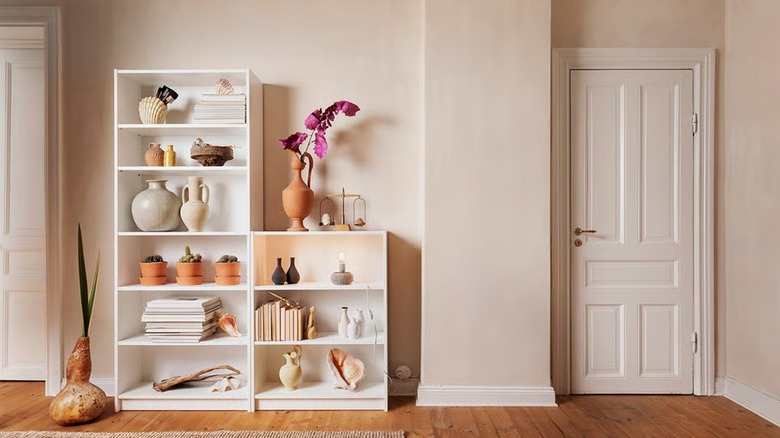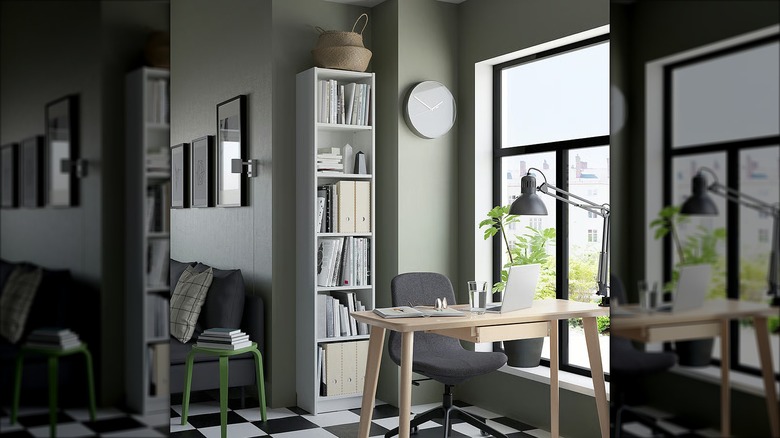The Big Change You'll Start Seeing On IKEA's Popular BILLY Bookcase (And Why It Matters)
IKEA is rolling out the second phase of its BILLY bookcase redesign. The Swedish furniture empire announced in 2022 that the iconic BILLY had undergone a makeover that would make manufacturing more circular, meaning its production would become more efficient and less wasteful with changes in material and design.
An announcement released by IKEA at the time explained that the changes included replacing the bookcase's wood veneer with paper foil printed to imitate the real deal, replacing the plastic edge bands with the same paper foil, and replacing the plastic nail assembly with a snap assembly. According to Apartment Therapy, the first alteration was implemented straight away in 2023, whereas models containing the last two tweaks are only now entering the market.
Naturally, IKEA wants customers to see these changes as upgrades that not only make BILLY more eco-friendly, but also more durable. Phasing out plastic in products helps reduce the company's environmental impact, while removing fasteners from the assembly process may just be the trick to longer-lasting IKEA furniture. Still, recent customer reviews tell a different story.
What's the verdict on the IKEA BILLY changes?
It's fair to say that a lot of the changes to the BILLY bookcase, a continuous best seller for IKEA, were made with company profits in mind in addition to environmental concerns or customer satisfaction. The biggest shift, replacing wood veneer for cheaper paper foil, first on the sides and now also on the edges, allowed the company to cut costs in the face of pandemic and war-induced inflation. But two things can be true at once. This change not only reduces plastic use, but can also positively impact energy consumption by eliminating the need for the hot ovens previously used to dry the veneer, thus helping the planet.
The piece of the puzzle that seems to lose out in this scenario is the customer. On one hand, cutting production costs allows IKEA to keep prices down, maintaining the consumer's buying power. On the other hand, recent reviews have reported the new covering peeling with little use. "The new stickers they use instead of veneer peel and damage very easily, and just look cheap. The seams are visible and flaky. Mine were damaged out of the box," wrote one unhappy patron. Not everyone will be interested in repairing dents or cracks in IKEA furniture. Therefore, it begs the question: is it worth making production more eco-friendly and products more affordable if it will just lead to more frequent replacements and, consequently, more waste?
Snap fittings could be the best thing about the new BILLY
With more people renting and living in temporary homes rather than their forever homes, ensuring that they're buying furniture that's built to last through multiple moves is becoming a priority. Even if reviewers say the new paper foil cover is hurting the IKEA BILLY's chances of a long life, the move away from nails and towards snap fittings in assembly may offset some of that. Yes, the contact paper may peel more easily — some customers even report the print rubbing off when cleaned with a moist towel — but at least the famous bookcase can now be taken apart and put back together with minimal risk of damage.
Snap fittings use a ribbed wooden dowel system that facilitates assembly. These pieces click into pre-drilled holes, erecting the furniture without the need for fasteners. The technology has been in use since 2014, namely in products from the REGISSÖR and STOCKHOLM series. According to the company, the pieces can be pulled apart without affecting their integrity, which can even be beneficial for partial repairs. However, snap fittings don't exactly have a blemish-free reputation either. One need only look at the most recent reviews for the IKEA REGISSÖR cabinet to find buyers complaining about holes that don't line up and the need for strenuous force to attach the different parts. As for whether the same issues will emerge with the BILLY assembly, only time will tell.


